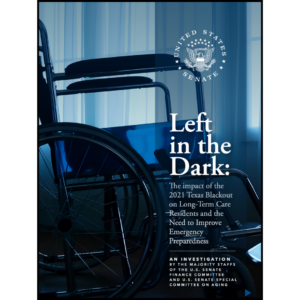Public outrage over CPR incident raises questions for LTC providers
Rushing to get ready for work Monday morning and half listening to The Today Show’s news update, I was stopped in my tracks by the report of a retirement community’s nurse who refused a 911 dispatcher's pleas to perform CPR on a woman who had fallen unconscious and later died. I stood transfixed as the program broadcast the dramatic and shocking 911 call. Like millions of other viewers who listened, my reaction was immediate and visceral: How could anyone with an ounce of compassion refuse to aid an elderly person in physical distress?
Reader reactions to numerous online and print versions of the story mirrored mine, with a few exceptions—mainly nurses and other long-term care workers who cautioned against rushing to judgment before more facts come to light.
For example, there was some early confusion as to whether the resident of Glenwood Gardens, a Brookdale Senior Living community, had a DNR (do not resuscitate) order in place, although it since has been confirmed that she did not have one. Was the nurse who made the call aware of this? We also don’t know whether the nurse who made the call was licensed or not. Should that matter?
Last night national broadcast news programs continued to focus on the story, raising an important issue for potential residents and their families: Do you know a retirement/LTC community’s policies and, if not, it’s critical to get clarification. Families need to discuss end-of-life care and advance directives. Conversely, providers should have clearly communicated care policies for all residential types—from independent living and assisted living to skilled nursing. At the same time, it’s obvious that the general public needs to be better educated as to the differences between the various types of long-term care/senior housing and what services providers will and will not provide for each.
I spoke with Alan Horowitz, an attorney and former respiratory therapist and registered nurse, who has written for Long-Term Living on legal issues in the long-term care industry, for his thoughts on the issue.
He suggests that regardless of whether independent and assisted living communities are regulated by federal or state or local law to require staff to perform CPR or other medical care, they should rethink their policies.
“I find it disconcerting that a nurse would refuse to provide potentially life saving measures,” says Horowitz. “It’s very unfortunate that CPR wasn’t done and while it may not be a legal obligation I would suggest there is an ethical and moral obligation.”
Safety expert and Long-Term Living contributing blogger Stan Szpytek adds that “it is always better to err on the side of safety or in this case, of the patient. Do not hesitate to render aid or over-treat (or over-respond versus under-respond to a situation).”
“This was apparently a witnessed cardiac arrest which makes this even more disturbing because the greatest chance of resuscitating someone is when there’s a witness to cardiac arrest,” Horowitz says. “Additionally, in order to increase the likelihood that bystanders will perform CPR in nonclinical settings the American Heart Association in 2010 adopted a ‘hands only’ CPR, so it would have been very easy for the nurse or a bystander to do chest compressions until emergency responders arrived. The longer it takes before CPR is instituted, the less likely survival will occur.”
Like airports and shopping malls, Horowitz suggests that LTC communities consider the addition of AEDs (automated external defibrillators) and that to avoid confusion about DNR orders during an emergency, residents with DNR orders should wear a band or bracelet similar to medical alert bracelets that many diabetics wear, for example.
Finally, Brookdale Senior Living has an epic public relations crisis on its hands. Calls and emails to its headquarters yesterday for comment were not returned as of this afternoon. I’m sure the company’s executives are scrambling to construct a public statement that will best protect its interests. Let’s just hope they work as diligently to revise a policy to best protect its vulnerable residents.

Patricia Sheehan was Editor in Chief of I Advance Senior Care / Long Term Living from 2010-2013. She is now manager, communications at Nestlé USA.
Related Articles
Topics: Disaster Preparedness , Executive Leadership , Risk Management











